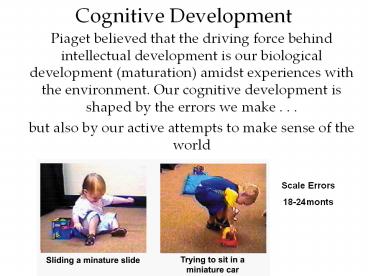Cognitive Development - PowerPoint PPT Presentation
1 / 18
Title:
Cognitive Development
Description:
Jean Piaget with a subject Bill Anderson/ Photo Researchers, Inc. Complex Classification Mental Reps ... We can now use symbols and imagined realities to ... – PowerPoint PPT presentation
Number of Views:157
Avg rating:3.0/5.0
Title: Cognitive Development
1
Cognitive Development
Piaget believed that the driving force behind
intellectual development is our biological
development (maturation) amidst experiences with
the environment. Our cognitive development is
shaped by the errors we make . . . but also by
our active attempts to make sense of the world
Scale Errors 18-24monts
2
Schemas
Schemas are mental molds into which we pour our
experiences.
3
Assimilation and Accommodation
The process of assimilation involves
incorporating new experiences into our current
understanding (schema). The process of adjusting
a schema and modifying it is called accommodation.
Bill Anderson/ Photo Researchers, Inc.
Jean Piaget with a subject
4
- Mental Reps
- Complex Classification
5
Sensorimotor Stage
In the sensorimotor stage, babies take in the
world by looking, hearing, touching, mouthing,
and grasping. Children younger than 6 months of
age do not grasp object permanence, i.e., objects
that are out of sight are also out of mind.
Doug Goodman
6
Cognitive Phenomena
- Stranger Anxiety
- Separation Anxiety (depends on attachment to the
parent) - Sense of Self
7
Sensorimotor Stage Criticisms
Piaget believed children in the sensorimotor
stage could not think they do not have any
abstract concepts or ideas.
However, recent research shows that children in
the sensorimotor stage can think and count.
- Children understand the basic laws of physics.
They are amazed at how a ball can stop in midair
or disappear.
8
Sensorimotor Stage Criticisms
2. Children can also count. Wynn (1992, 2000)
showed that children stared longer at the wrong
number of objects than the right ones.
9
Preoperational Stage
Piaget suggested that from 2 years old to about
6-7 years old, children are in the preoperational
stagetoo young to perform mental operations.
Ontario Science Center
10
Preoperational Stage
- DeLoache (1987) showed that children as young as
3 years of age are able to use metal operations.
When shown a model of a dogs hiding place behind
the couch, a 2½-year-old could not locate the
stuffed dog in an actual room, but the 3-year-old
did. - Mental Representations are fully formed
- Hence language development and pretend play
11
Problems in Preop
- Conservation
- Centration
- Irreversibility
- Concrete
- Perceptually Bound
- Magical thinking
12
Problems in Preop contd Egocentrism
Children cannot perceive things from anothers
point of view.
When asked to show her picture to mommy,
2-year-old Gabriella holds the picture facing her
own eyes, believing that her mother can see it
through her eyes.
13
Theory of Mind
Preschoolers, although still egocentric, develop
the ability to understand anothers mental state
when they begin forming a theory of mind. The
problem on the right probes such ability in
children.
14
Concrete Operational Stage
In concrete operational stage, given concrete
materials, 6- to 7-year-olds grasp conservation
problems and mentally pour liquids back and forth
into glasses of different shapes conserving their
quantities.
Children in this stage are also able to transform
mathematical functions. So, if 4 8 12, then a
transformation, 12 4 8, is also easily doable.
15
Formal Operational Stage
Around age 12, our reasoning ability expands from
concrete thinking to abstract thinking. We can
now use symbols and imagined realities to
systematically reason. Piaget called this formal
operational thinking.
16
Formal Operational Stage
Rudiments of such thinking begin earlier (age 7)
than what Piaget suggested, since 7-year-olds can
solve the problem below (Suppes, 1982).
If John is in school, Mary is in school. John is
in school. What can you say about Mary?
17
Reflecting on Piagets Theory
Piagets stage theory has been influential
globally, validating a number of ideas regarding
growth and development in many cultures and
societies. However, todays researchers believe
the following
- Development is a continuous process.
- Children express their mental abilities and
operations at an earlier age. - Formal logic is a smaller part of cognition.
18
- Star Wars according to a 3 year old






























